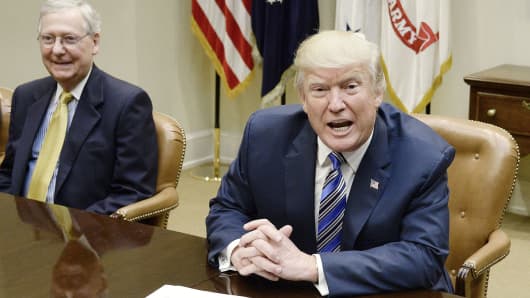And then, Kansas actually raised sales taxes and tobacco taxes in 2015. That put more of the tax burden on the poor, and it sure looked like a cynical quick fix for falling revenues.
But the list of irresponsible mistakes gets uglier.
The Kansas tax cut policy also foolishly didn't eliminate many deductions and loopholes like Governor Brownback initially promised. Worse, the tax policy allowed for the total elimination of taxes on pass-through entities. Pass through entities are businesses that pay taxes through the individual income tax code instead of the corporate code. Even anti-high tax groups like the Tax Foundation warned that doing this was, flat out, going too far. This was a cardinal sin for even conservative Republican tax reformers, who always argue that tax cuts and tax simplification must always come with broadening the base of job-holding and income-earning taxpayers, not shrinking it.
The result was a sharp increase in budget deficits that became so severe that the Republican controlled legislature had to end the tax cut policies earlier this year, overriding Brownback's veto of a $1.2 billion tax increase.
It's simple math and common sense. While cutting taxes can lead to growing tax revenues when more jobs are created and investment is encouraged, those increased revenues won't necessarily come in overnight. The only responsible thing to do is cut government spending in the first year or two after tax cuts are enacted to avoid state deficits and keep essential services running. And remember, states like Kansas don't have the luxury of submitting unbalanced budgets to the legislature like the federal government can and does year after year.
The good news is that there's decent evidence the Trump administration and the congressional GOP leaders have either learned the lessons they really need to learn from Kansas, or already knew them. Many deductions and loopholes in the federal tax code have reportedly been targeted in the Republican tax reform plan. And Treasury Secretary Steven Mnuchin has already said that the tax reform planning process is going to produce pass through entity rules that will stop the richest Americans from using them to avoid paying taxes.
The bad news is that President Trump and Congress show no signs of cutting spending. And even though tax revenues are hitting record highs almost every month, that spending is outpacing those revenues and boosting deficits. When Brownback first proposed the tax cuts in Kansas, corresponding spending cuts or reforms to the big items like education and Medicaid were simply not something even most conservatives in that state wanted to enact. This is similar to the hard truth that our national debt cannot be fixed until Washington is willing to reform and effectively cut Medicare, Social Security, and defense. Good luck with that.
Both Kansas and Washington don't really have a tax cut or tax policy problem. They have a spending problem that's more like a spending addiction. It's so bad that the common sense benefits of reduced costs for businesses and investment in a place like Kansas still left the state in a fiscal state of emergency. And it's so bad that despite a rebounding economy and record stock market numbers, our national deficits keep coming and our national debt keeps growing.
The cost of those deficits and debts are already a drag on the national economy. Just paying the interest on the national debt keeps taxes high and encourages major employers to go or stay overseas. And even with today's lower interest rates, the current debt is more than 100% of our GDP. If the spending addiction in Washington isn't addressed soon, even the smartest tax cut plan won't grow the economy enough to fix it.
Commentary by Jake Novak, CNBC.com senior columnist. Follow him on Twitter @jakejakeny.
For more insight from CNBC contributors, follow @CNBCopinion on Twitter.



